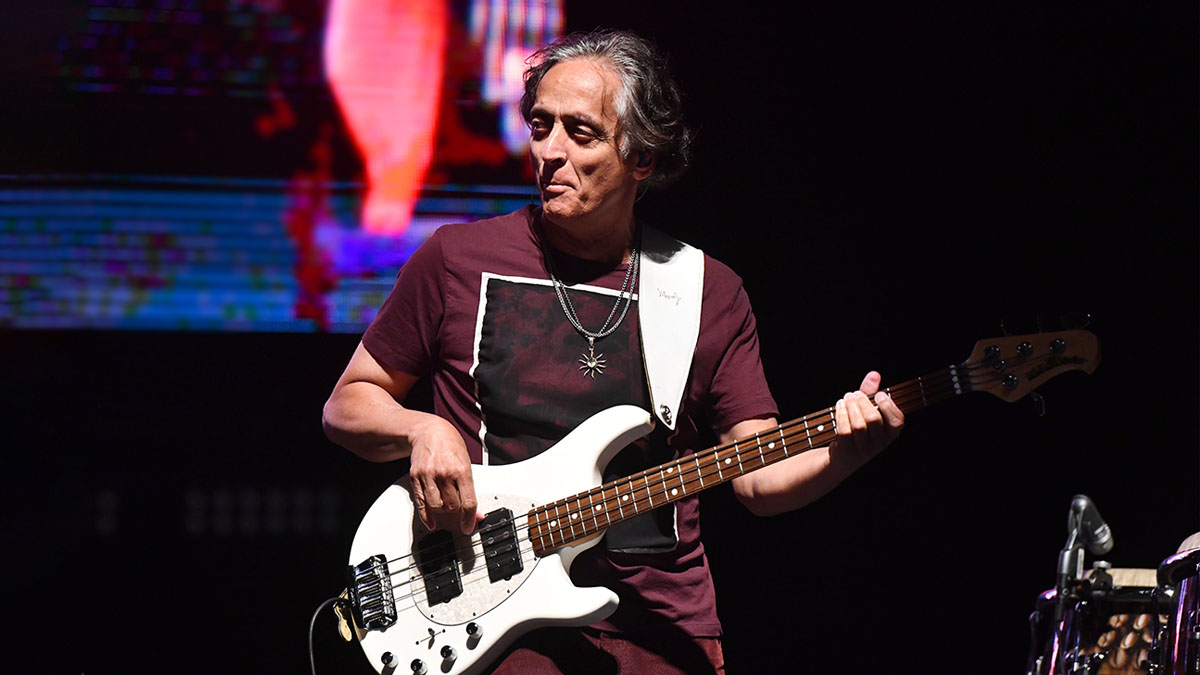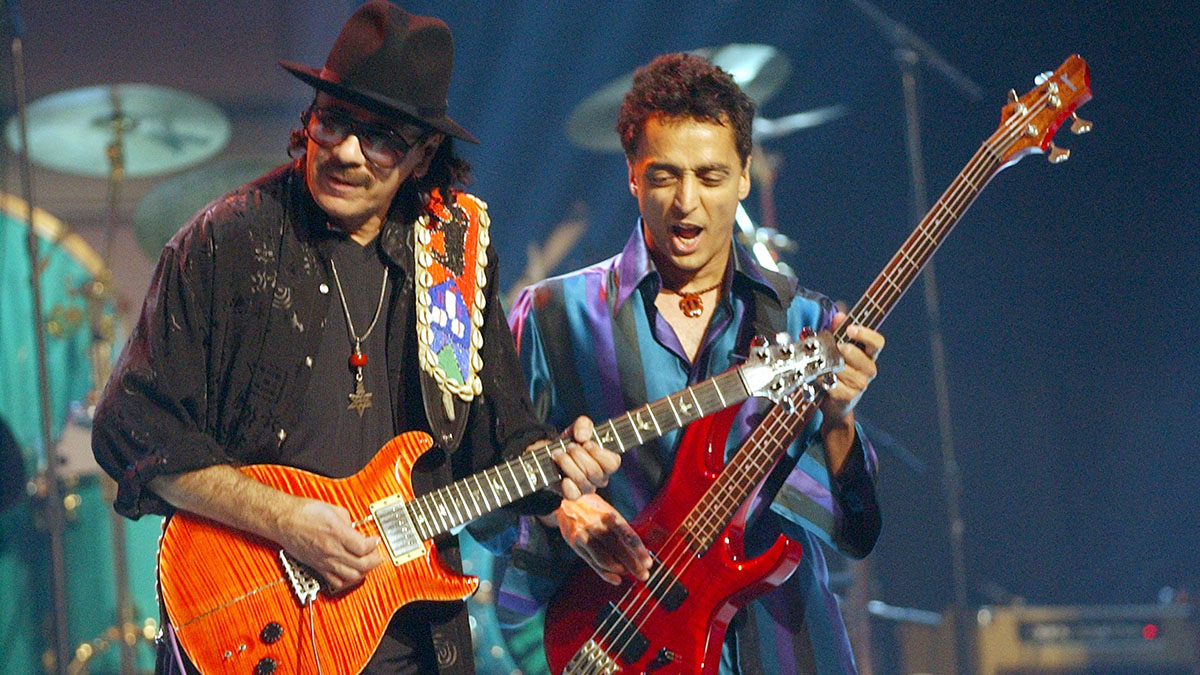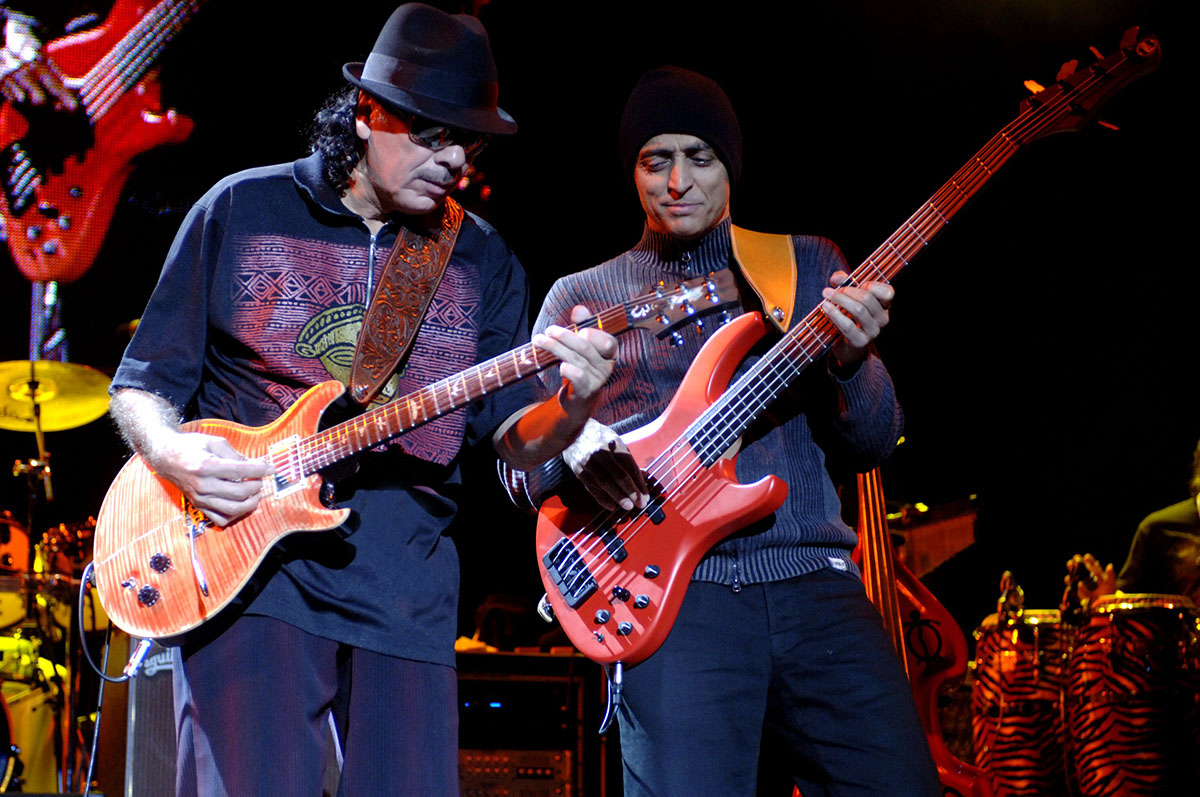Carlos Santana’s long-time bassist Benny Rietveld reflects on a career at the front line of expression
Rietveld on playing with Miles Davis and Carlos Santana, the pivotal points in his prolific bass-playing career and the gear choices he swears by

The Holland-born, Hawaii-raised bass guitar star Benny Rietveld is no stranger to demanding gigs, having played with the late Miles Davis towards the end of the late jazz icon’s career, and having held down the low-end with the mighty Carlos Santana since 1990.
His most-heard bass part is undoubtedly the line anchoring the inescapable Smooth from 1999, but he has also delivered miraculous contributions to recordings by Herbie Hancock, Eagle Eye Cherry, John Lee Hooker, Sheila E, and as a solo artist.
Let’s find out what he’s up to...
What’s happening, Benny?
“We just came back from a week of doing some recording with the Santana band – just personal projects that Carlos wanted to do. That’s what all the rock stars are doing now. They can’t play live, so they want to record. I’ve been writing a lot, and doing bass lessons, but bass is a hard one to do remotely.
"It’s a rhythm section instrument, and I can’t even clap along with the students to give them a sense of where to go in time. I don’t do a lot of those lessons, because they don’t really work.“
Do you still need to practice to keep your chops up?
Get The Pick Newsletter
All the latest guitar news, interviews, lessons, reviews, deals and more, direct to your inbox!
“Oh, I think everyone can benefit from practicing. I know I can. If I wanted to try to do some of the things that Victor Wooten does, it would probably take me the rest of my life. It’s the whole body stamina thing – like, this is more tiring than I remembered. There’s a little bit of work on chops, but it’s mostly about the stamina and the physicality of it.“
After decades of playing bass, have you managed to escape injury?
“My basses aren’t that heavy, and I stretch a lot. Relaxed playing helps, too: I tell my students only to put their energy where it’s supposed to go. Everything else should be relaxed. So far, knock on wood, I haven’t really had very many problems.“
The first bass-line that I played, although it was on a guitar that I had, was the bass-line from The Ballad Of John And Yoko by the Beatles
What was your journey into bass?
“It was the typical one: I was shunted off onto bass from another instrument! I was a drummer at first in the little band that I had, and our bass player quit, and we didn’t know any other musicians except another drummer. So I said, ‘Okay, we’ll hire that guy, and I’ll be on bass.'"
What was your first bass guitar?
“It was a Hagström with a plastic front that looked like a speaker grille. I liked it. The first bass-line that I played, although it was on a guitar that I had, was the one from The Ballad Of John And Yoko by the Beatles. The first actual line that I played on bass, or tried to play on bass, was Lovely Rita, which is also by the Beatles. When I played it, I only used two strings. My cousin saw my left hand jumping up and down and said, ‘You can use more than two strings, Benny.'"

Which bassists influenced you?
“The first bass guy I gravitated towards was Chris Squire. I heard Yes and I was like, ‘What?!’ I still use little parts of [his solo] from The Fish live in my bass solo. I even wanted a Maestro Bass Brassmaster [Squire’s fuzz/octave pedal] when I was a kid, but it was so expensive. I had a Big Muff instead.“
When would you say you were up and running as a bass player?
“Maybe by the age of 14, playing simple music – dance music and all that. I was able to play a bunch of gigs, and I thought I was pretty good, but I wasn’t in New York or any place where I could really seriously learn about the bass. I don’t think I was really aware of how to create a foundation until my twenties – and when I did know that, it was a rude awakening, because I found out how little I knew."
Are you thinking of a specific gig that you played when you say that?
“Yes. It was via the Crusaders, actually, of all bands. They hired me to play three shows that, inexplicably, they couldn’t find a bass player for. They had two bassists at the time – Alphonso Johnson and Abraham Laboriel – but neither were available for these three shows.
“They flew me to LA to audition, but as far as playing a groove, apparently I didn’t have a clue. They let me know that pretty early on, in no uncertain terms [laughs]! But it was great. They still had me play. I guess they decided they’d suffer through it. It was a rough experience, but really good.“
Tell us about playing bass with Miles Davis.
“Well, we would develop the arrangements, and sometimes he gave me a few specific instructions, like, ‘Put a little lift in this section,' with maybe just a pedal or something like that, but mostly they were set. I would develop a bass line over that, based on what had come before.
“There was a lot of freedom, and there was some great jamming, but with bass, especially in that kind of music, it’s a heavy responsibility. I always use the Spider-Man line with my students – ‘With great power comes great responsibility’. If we start changing things because we feel like it, then things don’t feel right. You don’t want to cause the destruction of the universe.“
Miles was completely devoted to the music and the experience. He insisted on being very present the whole time you were on stage and being 100 percent committed to the music
Indeed. What kind of man was Miles?
“He was fine. He was completely devoted to the music and the experience. He insisted on being very present the whole time you were on stage and being 100 percent committed to the music. I’m pretty sure that was the way he was, his whole career.
“It was intimidating, because if you drifted just a little bit mentally, he would feel it, and those laser eyes would suddenly go on you! But he was fun. He made plenty of jokes. He’d tell me, on the side, when somebody was doing a solo or whatever, ‘Guys always play louder when girls are on their side of the stage’, and I would laugh. So he was actually kind of a sweetheart, but very guarded, and insisting on a high level of commitment.“
How did you come to meet Carlos Santana?
“That was when I was still playing with Miles. Carlos had seen me play because he was a big Miles Davis fan, and he said, ‘Hey man, great to meet you. I might be looking for a bass player. Are you interested?’ I was planning to leave Miles anyway, perhaps not consciously, but I knew I was reaching a point where I should jump off. So later on I called Carlos and I auditioned with his band. I grew up playing all his songs, and they seemed to think I was good, so I was hired.“
How did Miles take the news that you were leaving?
“It was at the end of a tour, and we were all going our separate ways. I told him, ‘Hey, I’m leaving,’ and he thought I meant I was leaving for the airport. He said, ‘Oh, okay. See you’, and I had to say, ‘Oh no, actually I’m leaving the band’. It was really awkward, and I think he was a little bit puzzled, but in terms of guys like me coming through the band, I think he wanted to see people develop and go, so it was all right. That’s the impression that I got.“

Tell me about your bass gear.
“I use a QSC 1000-watt power amp. Brian Montgomery, who is our monitor guy, makes cabinets under the name Bad Monkey, and I use those on the road. They’re beautiful, and they really take a lot of SPL. I could probably get away with less power now, because I remember the days when the band was super-loud.
“When I joined, Carlos had tons of cabinets. The percussionist and the drummer were playing on 11, so I really needed an insane amount of power not to clip all the time. For basses, my mainstays are my Music Man Sterling Deluxes and my NS Design CR series electric upright.
“At home I've been playing an MTD Andrew Gouché model, which is also a beautiful bass. The NS has a really huge, full sound. The house guys are like, ‘Can you please play it all night?'"
Joel McIver was the Editor of Bass Player magazine from 2018 to 2022, having spent six years before that editing Bass Guitar magazine. A journalist with 25 years' experience in the music field, he's also the author of 35 books, a couple of bestsellers among them. He regularly appears on podcasts, radio and TV.
“I asked him to get me four bass strings because I only had a $29 guitar from Sears”: Bootsy Collins is one of the all-time bass greats, but he started out on guitar. Here’s the sole reason why he switched
“I got that bass for $50 off this coke dealer. I don’t know what Jaco did to it, but he totally messed up the insides!” How Cro-Mags’ Harley Flanagan went from buying a Jaco Pastorius bass on the street to fronting one of hardcore’s most influential bands














